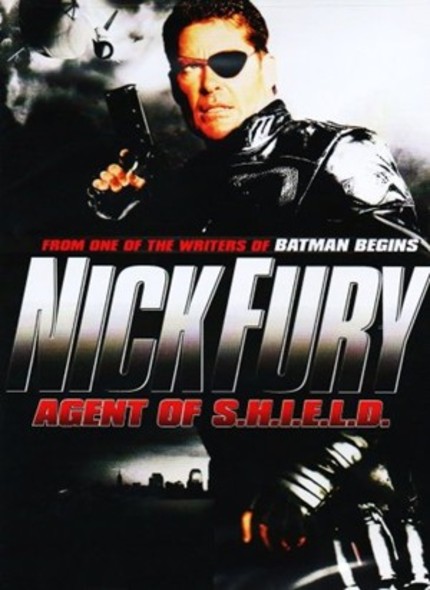Marvel In The 90's: NICK FURY AGENT OF SHIELD Review

For the first time in maybe forever, Marvel actually hired a writer for their next live-action attempt at greatness who had actually been totally immersed in genre work. And in 1998, David Goyer had three screenplays produced, two of which were great (Dark City and Blade). The third, however, was for Nick Fury: Agent of SHIELD, and is an unmitigated disaster.
As I'm sure you all know, Goyer would go on to write all three Blade films, as well as Batman Begins and he would contribute to The Dark Knight and the upcoming Ghost Rider and Superman films.
For the most part, Nick Fury is a fairly accurate approximation of the comic's version of the character. He's a badass old soldier and walking PR nightmare who doesn't get along with the suits in charge. He's surrounded by friends and allies straight from the comics: Dum Dum Dugan, Gabe, and Contessa. There are even L.M.D.s and Helicarriers, and he's going up against Hydra and Baron Strucker and his kids. Arnim Zola is in there, too!
On paper, this is like a dream come true.
The casting isn't bad, with Lisa Rinna as Contessa and Garry Chalk as Dugan in supporting roles. However the main villains Werner Von Strucker and Andrea "Viper" Von Strucker are rough. Scott Heindl isn't too bad, as he isn't given much to do character-wise other than strut around all Euro-trashy. Sandra Hess is a Swiss actress who does a horrible German accent. And while it's kind of daring that Viper gets horny from murdering people, Hess is just not very good.
And then there's David Hasselhoff.
The Hoff actually looks the part. He's big and scowly. He chomps on the cigar like a champion. But then he opens his mouth and is just awful as he spouts lines that apparently can only work on the comics page. When spoken by a human being in what are supposed to be life or death situations they become trite and cartoonish.
His performance single-handedly scuttles this production.
After sitting through this movie a couple of times, I still can't figure out how it all just falls apart. It should at least be entertaining. I mean, if something as poorly actualized as Generation X can capture the right mood and create a textured world that could support its story, how can Nick Fury just not work at all?
This film is actually best enjoyed in snippets as all of the best elements are stylistic and are pulled off much better in Goyer's other two '98 films. The leather-clad anti-hero look works better with Blade, and the pale, bald henchmen actually make sense lurking around in Dark City. As in Generation X (or even Trial of the Incredible Hulk), the film draws to a conclusion as open-endedly as possible with Viper escaping with the frozen body of her father, who is reawakened in an epilogue wearing a super snazzy bow tie before bow ties were cool.
That actually makes some sort of sense, because I'm sure this sounded like a winner from the very beginning. Hasselhoff was still a recognizable name that should have drawn viewers, but he was coming to the end of his run on Baywatch and the kitsch-factor of his casting probably played as much a part as his ham-handed performance did in Nick Fury not getting picked up.
Somehow, Goyer and director Rod Hardy managed to suck all the fun out of super spies while still working in just about every cliché that is humanly possible. The characters are only interesting because of their names and their comic histories. The action is poorly orchestrated and worse, just boring.
Strangely, while Goyer's script falls flat here, Blade, which employs many of the same stylistic elements and dialogue quirks, works much better. I guess that's what happens when you spend the money on a director with a vision and actors who aren't just collecting paychecks. As such, Nick Fury serves as a capstone to Marvel's failures on television (until the 2006 Blade TV series, anyway), but launches them into movie theaters with nary a look back.
Review by Paul Brian McCoy.






 (1)-thumb-80x80-93563.jpg)
